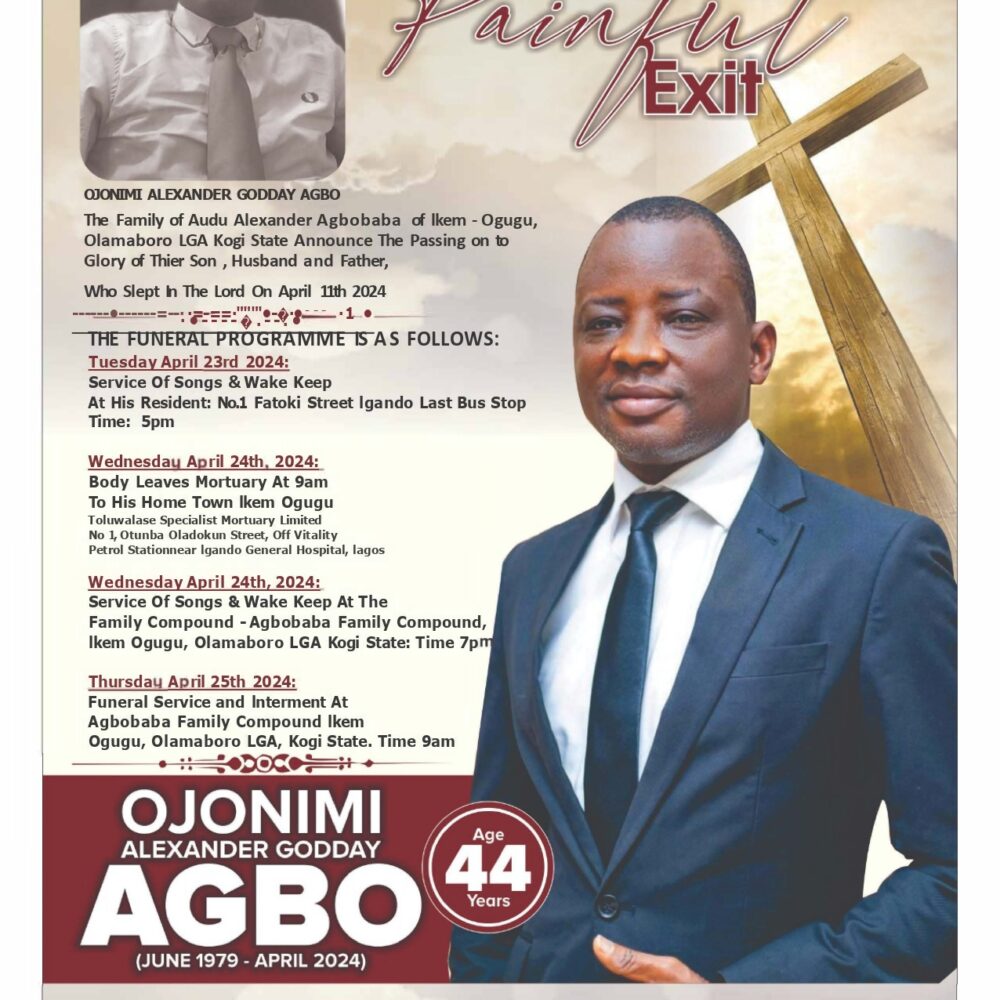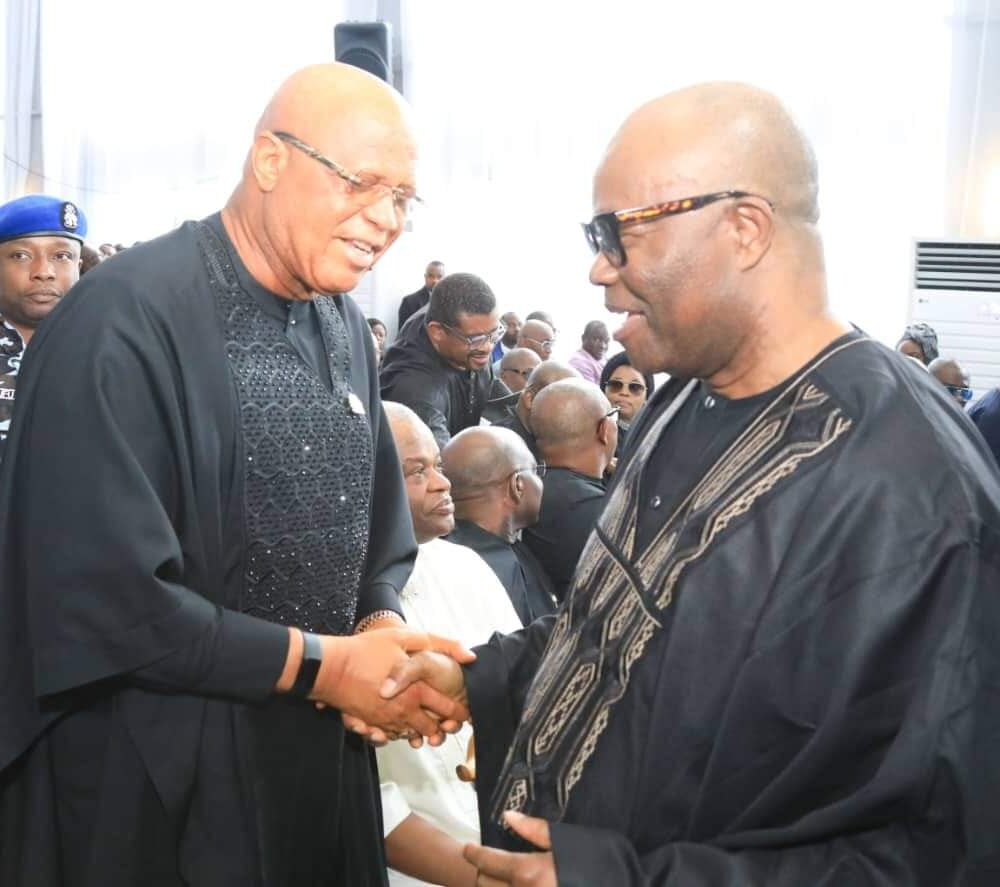Veteran Nigerian actor and filmmaker, Adebayo Salami, popularly known by his stage name, Oga Bello, recently celebrated his 54th year on stage. The actor who still features prominently in several Yoruba movies has shown no signs of slowing down just yet. The 65-year-old actor welcomed PREMIUM TIMES into his Ikorodu country home where he opened up on his career, family as well as future plans
PT: You began acting as far back as 1964 when the profession was yet to be accorded its recognition. Were your parents in support of your decision to become an actor?
Oga Bello: In those days, no parent wanted their children to go into acting, theatre or any entertainment because the general belief at the time was that acting was for dropouts or never-do-wells. My parents did not buy the idea at all and my kinsmen in Ilorin would never allow their children go into entertainment. Also, as the first son of my parents, the castigation was so much. But my passion for acting was too strong for me to overlook. I belonged to the Young Concert Party, under the leadership of Ojo Ladipo, popularly known as Baba Mero. After a few years, the group changed its name to Ojo Ladipo Theatre Group, and later metamorphosed into Awada Kerikeri Theatre Group. Following Mr Ladipo’s death in 1978, I took over the mantle of leadership of the group. It shot me into limelight. So you can see that I have always been passionate about the arts and culture.
PT: So what did you do next after your parents’ disapproval?
Oga Bello: I kept pleading with them and after some time, I ran out of the house. I went to stay with a late friend, Abayomi Aromire, in a church. He was older and after some time my family came there and dragged me out of the place. When I finished school, I joined the federal ministry of works and housing. I worked there between 1970 to 1974 as a library assistant. I was attached to then Federal Commissioner for Works and Housing, Femi Okunnu, and I worked with him from 1972 to 1974. I was his personal assistant until 1976 when he asked me to resign because his tenure had ended. I resigned and went on to become his personal assistant in his law chamber. I kept acting by the side and I became a full time actor in 1976.

PT: Having worked with a prominent lawyer like Mr. Okunnu, one would think you would have considered studying law.
Oga Bello: I actually wanted to study law but my passion for entertainment was overwhelming. I had to go into acting full time because we had actually agreed in our group then, at that time, the young stars concert party which had metamorphosed to Ojo Ladipo theatre that we would all do acting full time. So I had to resign, that’s how I forgot about studying law.
PT: Can you recall your earliest productions?
Oga Bello: In terms of stage plays, the first production I took part in was titled, B’aiyebayehun, and I acted the role of a witch doctor. Before the production, three of us auditioned for that part before I was eventually selected. That was in 1971. But we had been doing television series since 1969 with Baba Mero, who was the leader of the Young Stars Concert Party. But the name of the group was later changed to Ojo Ladipo Theatre. In terms of stage plays, it was Ogbongbemiga, which we staged at Glover Hall in Lagos Island that was the breakthrough for me. I shot my first cinema movie in 1985 and it was titled, Ogun Ajaiye, followed by Omo O’rukan in 1987. In 1989, I shot Eri Okan. However, I started shooting home videos in 1993, and my first movie was Asewo to re Mecca. I have produced 17 movies so far.
PT: Did you influence your son, Femi’s decision to study law?
Oga Bello: I don’t force my children to do anything against their will. Femi was naturally interested in studying law and I gave him my blessings. As God will have it, Mr. Femi Okunnu is my godfather and so I named Femi after him. I was surprised when Femi told me he wanted to study law.
PT: Having achieved so much, have you slowed down?
Femi: Well it depends on how you see it. I’m still very much around. I just came back from a location two days ago. You don’t relax in acting, you don’t retire, you just continue to move with the times and play it down because of the age and health. Thankfully, I have sound health. I’m not old yet or am I? So I’m still an actor, but I know I would need to cut down on my activities sooner or later. However, I can’t see myself sitting down at home for 3 or 4 days without going on location, writing scripts or to supporting a colleague’s production.
PT: Has your age limited the kind of roles you take on?
Oga Bello: I can fit into any role. The only role I cannot fit into is taking a girl to a hotel; I believe young men do that. Well it depends on the role, we have sugar daddies or what do you call it nowadays? My “boo” or something like that. If that’s the character I am asked to play, I can fit in. By and large, I can fit into any role. But I don’t expect a producer would expect me to play love in the garden, no. It’s not part of our culture and it’s not realistic. You can’t ask me to come and portray that kind of role regardless the amount you pay.
PT: How would you compare your industry then and now?
Oga Bello: If anybody had told me that I will live on acting, I’d argue. I spent most of my salary trying to build a career in acting without expecting anything. Today, it is quite different. Like I said, we try to move with the times. There was a time that it was just stage, then television, and then magazine those days. If you continue to move with the times, you would remain relevant. When we began acting in those days, we didn’t expect money, now we charge, that’s the difference. Most of our junior colleagues now don’t even get properly trained before they go into acting.
PT: What are you doing about that as one of the leaders in the industry?
Oga Bello: We’re doing our best but you know unemployment, poverty leads you to “let me go and do it.” And the bad thing about Nigerians is that once they see that this business or profession is lucrative, they’ll want to go for it, regardless of the experience they have, the knowledge they have. I always tell them, if you don’t learn it properly, you can’t know it. We’re trying our best by doing some seminars; I have a school, U-bee performing school of arts. Femi has a school, J15 and some of our colleagues too. If you can’t study theartre arts in the university, there are several ways to learn it.
PT: Did you father 18 children because you really loved to have many children?
Oga Bello: I guess it’s my destiny. In my life I only planned for my wife and
myself but when the stardom came, I was unable to manage it. At a time, I didn’t like what I was doing but there was nothing I could do. Then people always reminded me of my destiny. I remember the time we used to go round, which I won’t ever do again, visiting Muslim clerics. They would ask if I was from a royal family because they could see many children surrounding me. Now that God has given me the children and they are all doing fine, you can see that it is destiny. I even advise my children against dabbling into polygamy. I always tell them that they don’t need to have many children like me.
PT: Your children are active players in the Yoruba movie industry. Was this planned?
Oga Bello: I didn’t force them. They are not the only children I have and they’ve chosen to go into the profession. I was more interested in seeing them get an education and they have satisfied me in that regard. Sodiq, who is into the production management, is a geologist, I offered him a job in Chevron through my friend, and he turned it down. Tope Adebayo that is a director is a computer scientist. Rewa who is an editor is a computer scientist as well. So they all chose their career paths themselves.
PT: What are some of the challenges you encountered on your way to the top?
Oga Bello: There are quite lots of challenges. Especially when we were doing travelling theartre. Up till now, there’s no journey you embark on that’s devoid of challenges. Your marital life, there are challenges, may God guide us. I just don’t like to remember because that stage has gone. In the theatre journey, there were challenges, you want to talk about accidents, times when you’ll be stranded in a town for about a week, no money to eat, sleeping in the hall, lots of them. But I thank God.
PT: Not much has been heard about the controversial Motion Picture Practitioners Council of Nigeria Bill, MOPPICCON. What’s the status?
Oga Bello: I was invited to join the steering committee of the MOPPICCON bill during President Olusegun Obasanjo’s regime. The idea behind the bill was that they wanted all of us to speak with one voice, which I liked. That’s why we selected few people out of each association (Nollywood, Kannywood and Igbowood) to come together to form the steering committee. We talked about how to make things better and submitted it to the then president. At that time, it had gotten the to the National Assembly before Mr. Obasanjo passed the baton. I don’t know the current position because we’ve not been invited.
PT: Did it have anything to do with you and some of your colleagues being invited to see President Muhammadu Buhari recently?
Oga Bello: No we went for a separate thing. They invited me to come and break with the president during the Ramadan fast and nothing more.
PT: Some persons say you were paid N2m when you visited the president. Is this true?
Oga Bello: If anyone has collected N2 million, maybe he took it on our behalf and he has cheated us. I say this because I didn’t collect anything. My flight and accommodation was sponsored and then we had the dinner with the president. That was all, nothing else.
PT: What’s your engagement with the federal or state government in propagating the film industry? I know you’ve been involved with Kwara State.
Oga Bello: Kwara state is working on a film village, Malete film village. During Fashola’s regime I was a committee member tasked with the formation of an entertainment industry in Lagos State. Everybody is trying his or her best and whenever we’re called upon to participate, we oblige. It’s difficult to have a film village. Government cannot do it alone, we must have investors and that’s what we’re looking for. Some people have shown interest but they’re scared. They’re afraid of bringing their investment in Nigeria. Otherwise, it’s not too difficult to get an investor, if not the position of the country.
PT: I remember some of your movies from the past like Taxi driver and the likes. We watched them on TV and in cinemas with the good quality celluloid that was used then.
Oga Bello: The Nigerian movie industry has a problem of distribution up till now. Go and look for a producer that has made it through distribution. I stand to be corrected but I must tell you that. Even I have lamented so much. Let’s talk about the cinema houses now; they take the larger percentage, which is not good enough for the producer. How will you produce another movie when you’re unable to recoup your money? You cannot eradicate piracy all over the world. The enabling law for piracy is very bad; it’s not strong enough. If a pirate steals a work and realises about a hundred million and the only punishment in court is fifty thousand, hundred thousand naira fine, won’t he pay and go back for it? Except there’s a strong punishment for it, that’s how we can scale through. That’s where government has not done enough which is quite unfortunate. I don’t want to apportion blames but all I know is that filmmaking has distribution problem.
PT: Can you share some of your travails as a Nigerian filmmaker and actor?
Oga Bello: In those days, we started with celluloid cinemas. Let me cite “Omo Orukan” as an example, I produced the movie in 1997, the total cost of that production was about N490,000 and I couldn’t do the post production here in Nigeria here. I took it to New York because we didn’t have the facilities in Nigeria at the time. I remember Augur film Corporation, New York, billing me $27,000. I had $25,000 and I was looking for the balance $2000. The latter was about N10, 000 at the time. Before I could get that ten thousand naira, I suffered.
Oga Bello and son, Femi Adebayo
PT: Did you break even with the film?
Oga Bello: When I released the film at N5 (cinema tickets), the capacity of the main bowl of National Theatre, Igammu, Lagos, was 3,600 people and it was a full house. The film was shown 12 p.m., 3 p.m., and 6 p.m. daily. All the money I borrowed was paid on time. Sadly, our economy has changed, we can no longer go for celluloid. In those days, we took our films to the cinemas but today we take it, online. That’s the major problem we are facing. I won’t blame anybody that goes for home video (DVD) that is very saturated because the latter helps sustain our audience.
PT: If you were to proffer solution to the issue of distribution, leveraging on technology, what will you suggest?
Oga Bello: My most recent movie titled “Adaba” was put online and it got almost six hundred thousand viewers within four months. That’s why your production must be top notch. If you don’t put much effort in your production, you may not even have up to hundred thousand viewers. Irrespective of the platform you want to choose, just produce a good movie. If you want to go online, you need to learn how to negotiate the best rates for you.
PT: What’s your relationship like with the likes of Ogogo, Yinka Quadri and others?
Oga Bello: They are all my children. We’re very close. Yinka Quadri has just left, if you’d arrived a bit earlier, you’d have met him. I’ve just spoken with Jide Kosoko. Remember the association, TAMPAN, I’m the chairman, board of trustees.
PT: As a father figures in your industry, how are you able to resolve conflicts among your colleagues?
Oga Bello: Resolving conflicts is one of the leadership qualities that God
has given me. Like I said, Yinka Quadri has just left here, I’ve tried to mend something between himself and a colleague. God has created each and every one of us for certain reasons, maybe that’s one of the reasons God created me. So, when my colleagues come to me for advice or to settle any rift, I’ll talk to them and they’ll agree with whatever I say. I always say the truth without putting sentiments into any judgment or statement I make.
PT: Any advice for younger actors?
Oga Bello: My first advice to them is to avoid choosing fast lane because
slow but steady wins the race. They should emulate that and stop looking for fast money. If you do it gradually, no matter what you’ll get there. Another one is that they should be honest with whatever they are doing and most especially, be prayerful.
PREMIUM TIMES.





